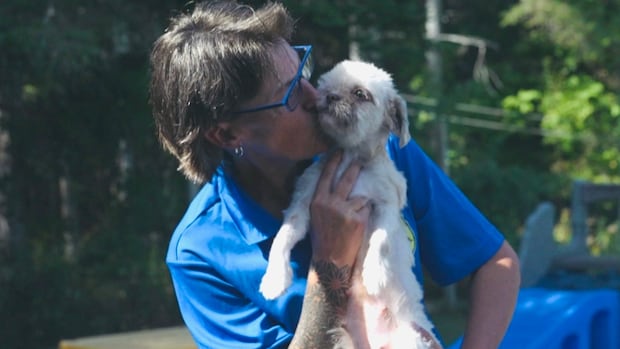New BrunswickElphie and her two puppies are on the road to recovery, after the SPCA seized her along with more than 60 other animals from a home in northern New Brunswick.New Brunswick SPCA seized more than 100 animals from 2 homes in recent monthsIsabelle Leger · CBC News · Posted: Sep 18, 2025 4:30 PM EDT | Last Updated: 2 hours agoShipley says, while it’s difficult giving away dogs she has fostered, it’s well worth it in the end knowing they’re going to a good home. (Aniekan Etuhube/CBC )A dog named Elphie was one of 65 animals seized by the New Brunswick SPCA from a residence in northern New Brunswick last month. Elphie and her two puppies are thriving now, thanks to her foster parents, but their lives were much different just four weeks ago. “I’ve been doing this for a long time,” said Stephanie Shipley, Elphie’s foster parent. “We have fostered over 830 animals, and this was probably the worst hygienic case I’ve seen.”Shipley said the fur was so matted the dog couldn’t eat or defecate. Her paws were matted with feces and hair, and she lacked so much muscle mass that she struggled to walk and climb stairs. The two surviving puppies from her litter of six were also emaciated. Emotionally, Elphie didn’t seem to be in much better condition. She was afraid of people — even those trying to help her.WATCH | WATCH | See Elphie with her puppies: Elphie the dog thriving one month after massive SPCA seizureNew Brunswick’s SPCA seized 65 animals from a home in the province’s northern region in August.Elphie’s first step to recovery was a clean shave. Next came exercises, to build muscle, and a nutritional diet.Now, Elphie and her puppies are plump, playful and happy. “She started to produce milk and now she can go up all of the stairs in the house. She runs and she plays now,” Shipley said. “She’ll go back and forth between people…. She’s pretty relaxed.” When Elphie arrived in Shipley’s care, her face was so matted she could not eat, and the fur around her anus was so matted she could not defecate. She also had difficulty walking. Now, she’s active and happy. (Aniekan Etuhube/CBC)Elphie’s story of recovery is just one of many like it across the province. This was the second large-scale animal seizure by the NBSPCA in six months. Two people were charged under the Criminal Code after 42 Shih Tzus and a cat were seized from a residence in Belledune in March. Those charges include causing pain, suffering or injury to an animal, and failure to provide care and medical care to an animal. No charges have been laid in connection with this latest seizure, involving 58 Shih Tzus and seven cats removed from a home in Gloucester County due to unsanitary conditions. Stephanie Shipley has been a pet foster parent for over 20 years. She’s been working to bring Elphie and her puppies back to good health. (Aniekan Etuhube/CBC )That investigation is continuing. “To me, what is important is that now these animals are safe, and we leave it to the officers to conclude their investigation and take appropriate action,” said NBSPCA executive director Lesley Rogers. Rogers said the NBSPCA was able to seize these animals in both cases thanks to complaints made by the public through the charity’s report line at 1−877−722�−1522.The reality of foster care Shipley has been a pet foster parent for over 20 years, and applauded the support that animal shelters in the province provide to people like her.Becoming one is as simple as making a call to your local shelter. “It’s been absolutely phenomenal,” she said of taking in the animals. “These little souls just need a safe place to land, especially if they’ve just experienced trauma.” Shipley is just one of many foster parents around the province currently caring for dogs and cats seized by the NBSPCA. (Aniekan Etuhube/CBC)Shipley said it is “heartbreaking” to see what these animals go through. She said it’s difficult to let them go once they have recovered, but worth it knowing they’re going to good homes. “The first day that they’re here with us, we make them a promise… ‘I promise you will never have to go through that again. You will never have to have puppies again, kittens again. You will never have to wait for a meal again,'” said Shipley. “And we’re over 380 strong in good promises.” Shipley said large-scale seizures lead to a massive community effort, since every animal involved requires a vet assessment and – ideally – a foster home. Shipley says Elphie and her puppies have been on a long journey to recovery, but are now doing well. Pictured is one of Elphie’s puppies, being held by the CBC’s Isabelle Leger. (Aniekan Etuhube/CBC )Karen Overall can attest to that. She’s a professor specializing in veterinary behavioural medicine at the Atlantic Veterinary College, based at the University of Prince Edward Island, and says the industry is underfunded and relies heavily on volunteers.”This is a major task for any regional shelter. It’s expensive. It means people at that shelter will be working around the clock; it means they will go through their list of fosters and reach as far in depth as they can,” she said. And speed matters when dealing with traumatized animals, said Overall, because the longer they wait to start recovering in their foster home to get ready to move into their forever homes, the higher the risk for long-term impact. “Most of these puppies receive none of the early social or environmental exposure that they need,” said Overall. “If we don’t get them into appropriate homes and get them early appropriate care, the risks of suffering behaviourally, emotionally and mentally for the rest of their life are huge.” Shipley said the three animals were all emaciated when they arrived in her care. Now, they are plump, energetic and happy. (Aniekan Etuhube/CBC)Overall said it’s not as simple as removing animals from a poor environment and moving them into a caring one. The change itself can take a toll on the animals’ mental health. “They’ve only ever seen that environment. Even if they’ve been neglected or abused – and I’m not saying this is the case here – but even if they’ve had the worst of all worlds, they’re terrified.” She said it is now the standard to provide animals in these situations with anti-anxiety medication, which will likely be something that animal is prescribed through foster care and potentially for life.ABOUT THE AUTHORIsabelle Leger is a reporter based in Fredericton. You can reach her at isabelle.leger@cbc.ca
From emaciated to good health: The story of 1 rescue dog and her puppies in foster care











